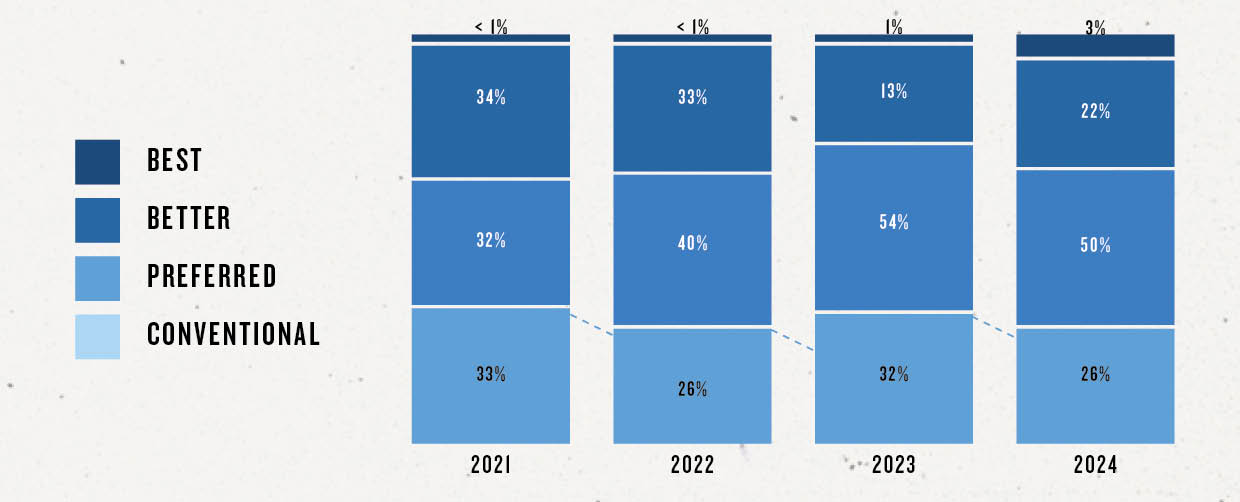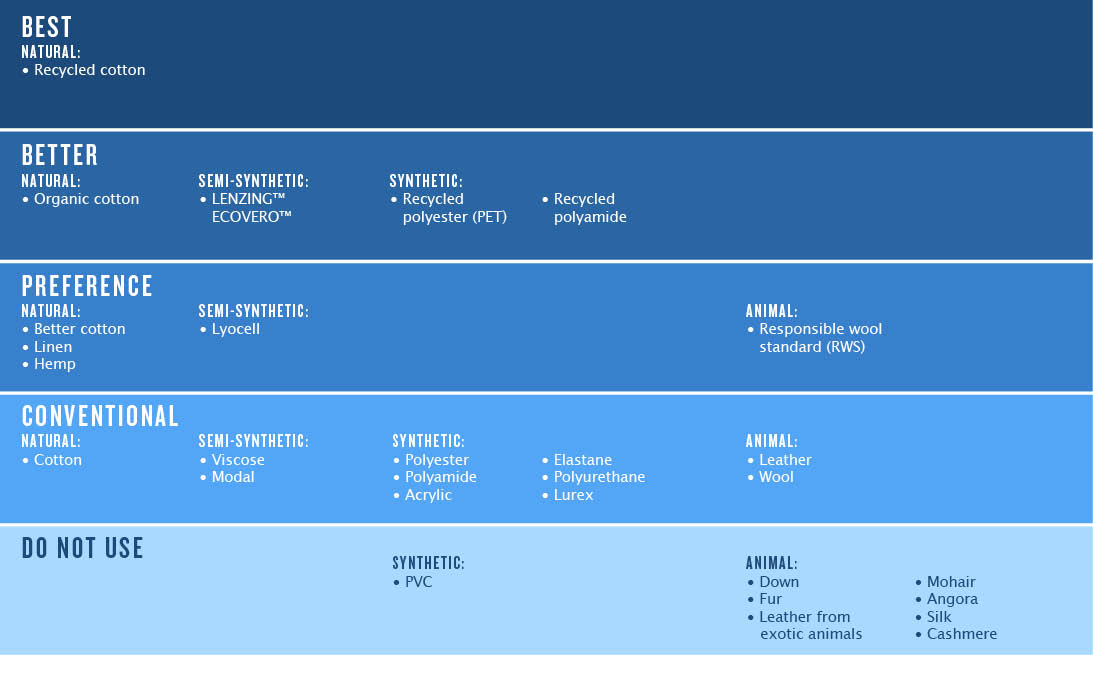Materials and chemicals
Clothing production has an impact on the environment in so many different ways. Massive quantities of water, energy, and chemicals are used to grow or manufacture fabrics, and to dye and wash them. This leads to water pollution and CO2 emissions, among other things.
To protect the environment and the communities that live in it, we all need to consume less, care better for our clothing, and we at America Today want to offer you more sustainable choices. That is why we have developed our sustainable collection: Care For Tomorrow. This label indicates that a product has been produced using sustainable production processes, and/or contains sustainable fabric, or that the fabric has been obtained through Better Cotton. Our aim is to reduce our impact on the environment and to quickly expand the Care For Tomorrow collection.
Materials
We prefer to use low-impact materials in our clothing and aim to expand this in the coming years. In 2024, 74% of the materials in our collection had a lower impact compared to conventional options.

Our aim for 2023 is that all our cotton will be organic, recycled, or sourced through Better Cotton. In 2025 we want to reach a total of 90% sustainable materials in our clothing.
We use a material ranking system based mainly on the Modint Fiber Matrix (MFM). to guide our sustainable choices. Materials not included in the MFM are labeled as “conventional.” We also list materials we explicitly do not use. This list is regularly updated according to industry developments. Our target for 2025 is to use 90% best, better, and preferred materials.

Organic cotton
We love organic cotton
- Organic cotton has the same high quality as conventional cotton but is more environmentally friendly.
- No toxic chemicals are used to grow it.
- Organic production has the potential to decrease cotton’s impact on global warming by 46% in comparison to conventional production methods.
- Organic cotton uses 62% less energy than conventional cotton.
- Our organic cotton clothing is always provided with a certificate that meets the recognized standards in the textile industry.
For more information about organic cotton, click here.
Better Cotton Initiative
America Today has been a proud member of Better Cotton since June 2018. Better Cotton trains farmers to use water efficiently, care for the health of the soil and natural habitats, reduce use of the most harmful chemicals and implement the principles of decent work. Better Cotton has calculated that, thanks to our contribution to Better Cotton, in 2022 an estimated:
- 206 million litres of water were saved
- 126 kg of pesticides were avoided
- 39 thousand EUR additional profit* was made by Better Cotton Farmers
*Better Cotton Farmers experience profit increases for a variety of reasons, most commonly due to increased yields and/or optimised use of inputs (such as irrigation water, pesticides or synthetic fertiliser).
Better Cotton is sourced via a system of Mass Balance. This means that America Today sources cotton via Better Cotton. It is produced by the farmer and sold to traders and yarn producers. Then the cotton fibers are mixed with other cotton. This means that Better Cotton isn’t physically traceable to end products, but the Better Cotton Farmers benefit from the demand for Better Cotton in equivalent volumes to those we source. For stories from the field, read here.
Last year, 90% of our cotton was sourced through Better Cotton. Our aim for 2023 is that 100% of our cotton is sourced as Better Cotton, or has an organic or recycled certificate.
Recycled polyester
- Recycled polyester is made from recycled waste such as plastic bottles and plastic packaging. By using recycled polyester, we are giving plastic waste a new lease on life and in doing so we are preventing it from being dumped in our beautiful nature.
- The production of recycled polyester requires 59% less energy and is estimated to have 32% lower CO2 emissions compared to new polyester*
- Our recycled polyester clothing is always provided with a certificate that meets the recognized standards in the textile industry.
Recycled polyamide
- Recycled polyamide is made with waste products from other polyamide products such as old fishing nets.
- The recycled materials reduce emissions by 26% compared to new polyamide*
- Our recycled polyamide clothing is always provided with a certificate that meets the recognized standards in the textile industry.
Recycled nylon and recycled polyamide are the same.
Recycled acrylic
- Recycled acrylic is made from acrylic waste. By using recycled acrylic, we give acrylic waste a new lease on life and prevent it from entering our nature.
- Our recycled acrylic clothing is always provided with a certificate that meets the recognized standards in the textile industry.
Recycled cotton
- By using recycled cotton, we extend the lifespan of a fiber that has already been made.
- The energy consumption for producing recycled cotton is almost 20% less than for producing conventional cotton.*
- Organic cotton clothing is always provided with a certificate that meets the recognized standards in the textile industry.
LENZING™ ECOVERO™ viscose
- LENZING™ ECOVERO™ branded viscose fibers
- Derived from sustainable wood and pulp, coming from certified and controlled sources.
- The manufacturing of LENZING™ ECOVERO™ branded viscose fibers generates up to 50% lower emissions and water impact compared to generic viscose.
o All of our items containing LENZING™ ECOVERO™ are certified. LENZING™ and ECOVERO™ are trademarks of Lenzing AG. More information about LENZING™ ECOVERO™ can be found here.
Livaeco™ viscose
- Livaeco™ viscose fibers from Birla Cellulose. Livaeco™ viscose fibers are sourced from FSC certified forests.
- The manufacturing of these fibers generates up to 55% lower GHG emissions and consumes up to 60% less water as compared to generic viscose, as per the Higg Material Sustainability Index (MSI) tool by the Sustainable Apparel Coalition.
Livaeco™ viscose fibers are traceable through the supply chain with blockchain technology. More information about Livaeco™ by Birla Cellulose can be found here.
Animal materials
We care about the wellbeing of animals. We have forbidden fur, exotic hides, silk, mohair, angora, and cashmere in our collections. We are on the Fur-Free List at Fur for Animals (Bont voor Dieren), and we are listed as an Angora Free and Cashmere Free Retailer at the People for the Ethical Treatment of Animals (PETA) Foundation.
In 2024, only 0.2% leather and 0.4% wool were used. Aware of potential welfare concerns (e.g., mulesing), we’ve signed the Brand Letter of Intent by FOUR PAWS and aim for full traceability of our wool products by 2025. We don’t use conventional down. Some jackets contain recycled down, which is durable and given a second life.
Although America Today is not certified for responsible wool or recycled materials, our suppliers and their supply chains are, and we request these certifications for traceability. Our animal welfare policy requires that animals be treated with care and respect. Partners must comply with EU and national animal welfare laws on farming, transport, and slaughter, and may only source from farms that meet the Five Domains Model for animal welfare. We strive for full traceability of wool and leather by 2025.
Processes
Responsible Use of Water, Energy, and Chemicals Clothing production consumes water, energy, and chemicals. We aim to reduce this impact by using these resources more efficiently and responsibly.
Responsible denim
It is likely the most popular fabric ever: denim. Unfortunately, the production of denim has various risks. The production of jeans requires a lot of water, chemicals, and energy, such as in the washing process for example. The washing process is done to give the jeans the right “look and feel.” Hazardous waste from these processes can end up in surface water. In a nutshell: denim production can have a negative effect on the earth. That is why we try step by step to make our denim production processes more sustainable.
From 2018 we started investigating how we can ensure sustainable jeans washes together with our suppliers. The result is our jeans with a “Low Impact” wash. Jeans are given a “Low Impact” score according to Environmental Impact Measuring (EIM) software from Jeanologia. EIM measures the impact from the process in four categories: water consumption, energy consumption, chemicals, and employee health. A low impact EIM score can be achieved by, for example, using recycled water, laser technology instead of chemicals, and energy-efficient machines. The benefit of the low-impact jeans can be found at the hangtags of the low-impact jeans.
In 2023, 50% of our jeans had a low-impact wash, compared to 26% in 2021. Our goal is to reach 100% by 2025.
Safe Chemical Use
We want our products to be safe for people and the environment. That’s why we share clear guidelines with our suppliers through our Restricted Substances List (RSL) and Manufacturing Restricted Substances List (MRSL). We regularly test our products for chemical residues and visit factories to monitor chemical usage. Employees are also trained regularly to identify risks and take appropriate action.
Newsletter
Subscribe to our newsletter and receive 10% off on your next order.
Shop with 10 euro discount
No thanks
America Today uses cookies on the website. We use technically necessary cookies, cookies to store preferences (functional cookies) and cookies to keep track of statistics (analytical cookies). In addition, we use cookies for marketing purposes like personalized advertising on third-party sites, including tracking cookies. For more information, view our cookie statement .
With 'Accept all cookies' you accept all cookies, including marketing and tracking cookies. With 'Refuse' you accept the functional cookies. If you only want the functional cookies, you can set your cookies yourself here.
Your privacy is important to us
This website uses different types of cookies. Some cookies are placed by third party services that appear on our pages. See also our cookie statement.
Manage cookie preferences
-
Functional
We use necessary cookies to run basic functionalities of the site. These cookies never collect personal data.
-
Analytical cookies
Web analytics cookies are used to measure the use of the website. This includes browser type, type of device with which you visit the website, how often and for how long the website is visited and which functionalities/pages are used the most. This data is used to optimize the website and to create more user-friendliness.
-
Preferences
Preferred cookies ensure that a website can remember information that influences the behavior and design of the website, such as the language of your preference or the country where you live.
-
Marketing
These cookies can be used, for example, to display personalized advertisements on our and third-party sites by our advertising partners who can combine the data with their own information.